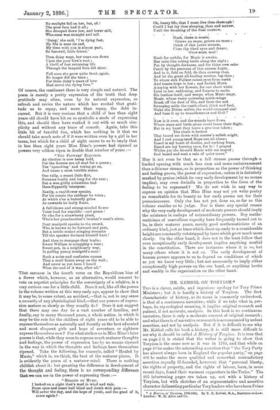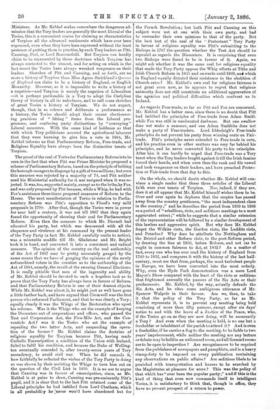MR. KEBBEL ON TORYISM.* Tins is a clever, subtle, and
ingenious apology for Tory Prime Ministers ; but it is hardly a history of Toryism. The first charaCteristic of history, as its name is commonly understood, is that of a continuous narrative ; while if we take what is, per- haps, its etymological meaning, it implies original research and patient, if not accurate, analysis. In this book is no continuous narrative, there is only a moderate amount of original research ; and what there is of narrative or research is accompanied by ardent assertion, and not by analysis. But if it is difficult to see why Mr. Kebbel calls his book a history, it is still more difficult to see why it should be called A History of Toryism. It is true that on page 2 it is stated that the writer is going to show that Toryism is the same now as it was in 1784, and that while on page 40 he makes the astounding assertion that "the Tory Party has almost always been in England the popular party," on page 408 he makes the more qualified and somewhat contradictory assertion (equally ill-founded, however) that "personal liberty, the rights of property, and the rights of labour, have, in more recent days, found their warmest supporters in the Tories." The 405 intervening pages are taken up, not with a history of Toryism, but with sketches of an argumentative and assertive character delineating particular Tory leaders who have been Prime
* A Hiatory of Toryism, 1788-1881. By T. .E. Hebbel, LL. Barrister.at•Law. London W. H. Allen and Co.
Ministers. As Mr. Kebbel makes somewhere the dangerous ad- mission that the Tory leaders are generally the most liberal of the Tories, this is a convenient course for claiming as characteristics of Toryism all the advanced sentiments which have ever been expressed, even when they have been expressed without the least pretence of putting them in practice, by such Tory leaders as Pitt, Canning, Peel, or Lord Beaconsfield. But Toryism can hardly claim to be represented by those doctrines which Toryism has always contested to the utmost, and for acting on which in the last resort the Tories have always wreaked vengeance on their leaders. Sketches of Pitt and Canning, and so forth, are no more a history of Toryism than Miss Agnes Strickland's Queens of Englund can claim to be a history of England, or English Monarchy. However, as it is impossible to write a history of a negation—and Toryism is merely the negation of Liberalism —it is perhaps pardonable in a Tory to adopt the Carlylian theory of history in all its nakedness, and to call some sketches of great Tories a history of Toryism. We do not expect, though, that in so solemn and deliberate a performance as a history, the Tories should adopt their recent electioneer- ing practices of " lifting" items from the Liberal pro- gramme, and confusing party distinctions by " conveying " Liberal measures. With the same kind of boldness as that with which Tory politicians assured the agricultural labourer that they were burning to give him a vote in 1884, Mr. Kebbel informs us that Parliamentary Reform, Free-trade, and Religious Equality have always been the distinctive tenets of Toryism.
The proof of the zeal of Tories for Parliamentary Reform is to be seen in the fact that when Pitt was Prime Minister he proposed a scheme of Parliamentary Reform, based on the principle of bribing the borough-mongers to disgorge by a gift of two millions; but even this measure was rejected by a majority of 74, and Pitt neither used his Ministerial authority for it nor resigned when it was re- jected. It was, too, supported mainly, except as to the bribe,by Fox, and was only proposed by Pitt because, while a Whig, he had with Fox's assistance three times proposed measures of Reform to the House. The next manifestation of Tories in relation to Parlia- mentary Reform was Pitt's opposition to Flood's very mild proposals in 1790. After that, though the Tories were in power for near half a century, it was not till 1867 that they again found the opportunity of showing their zeal for Parliamentary Reform. Even then the measure to which Mr. Disraeli had educated his party, but which was denounced with all the eloquence and virulence at his command by the present leader of the Tory Party (a fact Mr. Kebbel carefully omits to notice), was a miserable muddle till Mr. Gladstone and Mr. Bright took it in hand, and converted it into a consistent and radical measure. The opinion of the country on the real authorship of the Act of 1867 may be pretty accurately ganged by the same means that we have of gauging the opinions of the newly enfranchised voters in the counties as to the authorship of the Act of 1884, namely, the result of the ensuing General Elections. It is really pitiable that men of the ingenuity and ability of Mr. Kebbel should be devoted to such a hopeless task as to prove that the Tory Party has always been in favour of Reform, and that Parliamentary Reform is one of their dearest objects. While Mr. Kebbel was about it, he might just as well have gone a little farther back, and have argued that Cromwell was the first person who reformed Parliament, and that he was clearly a Tory ; equally clearly it was the Whigs of the Restoration who upset his reforms. Was it the Whigs who set the example of keeping the Dissenters out of corporations and offices, who passed the Test and Corporation Act, the Five-Mile Act, and the Con- venticle Act P was it the Tories who set the example of repealing the two latter Acts, and suspending the opera- tion of the former ? Mr. Kebbel claims the doctrine of religions equality for Toryism because Pitt, having made Catholic Emancipation a condition of the Union with Ireland, failed to fulfil his condition, and because the Duke of Welling- ton eventually conceded it, after twenty-seven years of Tory ascendency, to avoid civil war. When he did concede it, how faithfully he reflected the wishes of the Tory Party in doing so was shown by their assisting the Whigs to turn him out on the question of the Civil List in 1830. It is no use to argue that Canning was in favour of emancipation, since, as Mr. Kebbel is at pains to show, Canning was pre-eminently Pitt's pupil, and it is clear that to the last Pitt retained some of the Liberal principles he had imbibed from Lord Chatham, which in an probability he :never would have abandoned but for
the French Revolution ; but both Pitt and Canning on this subject were not at one with their own party, and had to surrender their own opinions to that of the party. But the best test of the zeal of the " Protestant " Tory Party in favour of religious equality was Pitt's submitting to the Bishops in 1787 the question whether the Test Act should be repealed as regards the Dissenters. It is surprising that even two Bishops were found to be in favour of it. Again, we might ask whether it was the same zeal for religions equality that made the Tory Party oppose the Whig efforts at Tithe and Irish Church Reform in 1835 and onwards unti11869, ana which in England equally dictated their resistance to the abolition of Church-rates ? Mr. Kebbel's own zeal for religious fairness is not great even now, as he appears to regret that religious animosity does not still constitute an additional aggravation of the agrarian and political difficulties which confront us in Ireland.
As regards Free-trade, so far as Pitt and Fox are concerned, Mr. Kebbel has a better case, since there is no doubt that Pitt had imbibed the principles of Free-trade from Adam Smith while Fox was still in uneducated darkness. But one swallow does not make a summer, and one Adam Smithite does not make a party of Free-traders. Lord Iddesleigh's Free-trade principles do not prevent his party from winning seats on Fair- trade. Pitt's principles never extended to Free-trade in corn, and his practice even in other matters was very far behind his principles, and he never converted his party to his principles. After him it can hardly be urged that Free-trade was a Tory tenet when the Tory leaders fought against it till the Irish famine forced their hands, and when even then the rank and file vowed and took vengeance on their leaders, and have preached Protec- tion or Fair-trade from that day to this.
On the whole, we should doubt whether Mr. Kebbel will con- vince a single reader that these three articles of the Liberal faith were ever tenets of Toryism. Nor, indeed, if they are, does it at all appear that Mr. Kebbel himself wishes them to be. Over and over again he deplores that the sceptre has passed away from the country gentlemen, "the most independent class in the country ;" and he describes the period from 1830 to 1868 as a period of "rebellions, riots, and seditious meetings to a most aggravated extent ;" while he suggests that a similar extension of the representation will be followed by a similar development of this lawless and aggressive spirit. But why does Mr. Kebbel forget the Wilkite riots, the Gordon riots, the Luddite riots, and Peterloo ? Why does he attribute the Nottingham and the Bristol and other Reform riots, to the post-Reform period, by drawing the line at 1830, before Reform, and not (as he
ought in common fairness to do), at 1832 As a matter of fact, every one who has ever read the history of England from 1760 to 1832, and compares it with the history of the last half- century, must see that from, perhaps, the most turbulent people in Europe, we have been converted into the most orderly. Why, even the Hyde Park demonstration was a mere Lord Mayor's Show compared with the least of the riots or seditious that frightened annually the passers of the Six Acts or their predecessors. Mr. Kebbel, by the way, actually defends the Six Acts, and he cites some ambiguous utterance of Mr. Spencer Walpole in their favour. Are we, then, to take it that the policy of the Tory Party, so far as Mr. Kebbel represents it, is to prevent any meeting being held consisting of more than fifty persons, except after six days' notice to and with the leave of a Justice of the Peace, who, if the Tories go on as they are now doing, will be necessarily a Tory ? And even when the meeting is held, is no one but a freeholder or inhabitant of the parish to attend it? And is even a freeholder, if he carries a flag to the meeting, to be liable to two years' imprisonment, while neither the meeting nor any lecture or debate may be held in an unlicensed room, and all licensed rooms are to be open to inspection P Are recognisances to be required from the publishers of newspapers and pamphlets, and is a heavy stamp-duty to be imposed on every publication containing any observations on public affairs P Are seditious libels to be punished with transportation and houses to be searched by the Magistrates at pleasure for arms?. This was the policy of that which has " ever been the popular party;" and if this is the kind of thing that even now commends itself to intelligent Tories, it is satisfactory to think that, though in office, they have no present prospect of a return to power.











































 Previous page
Previous page